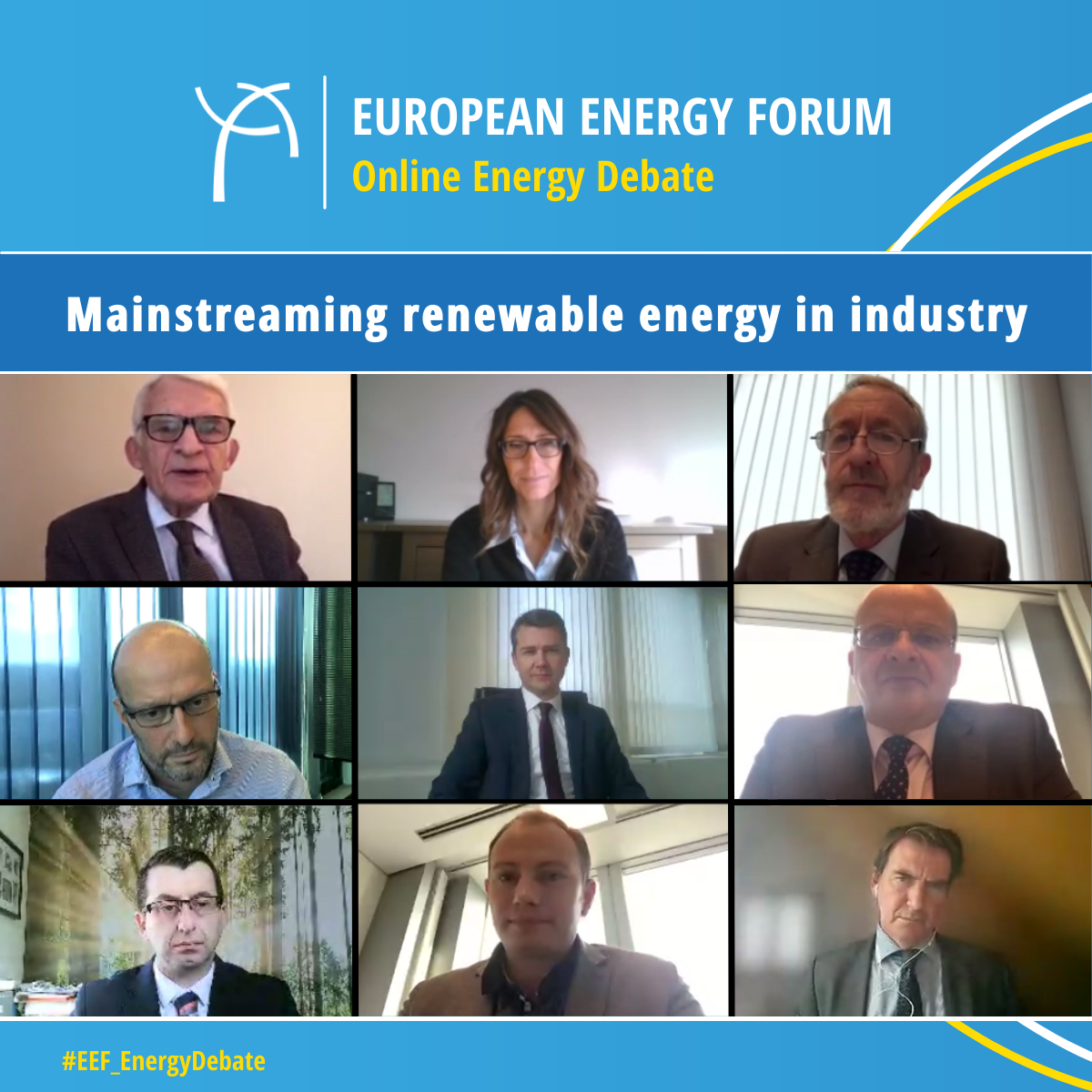Mainstreaming renewable energy in industry
Co-Chairs:
MEP Jerzy Buzek (EPP, Poland), President of the EEF
MEP Seán Kelly (EPP, Ireland), Director of the EEF
Speakers:
Nicola Rega, Energy Director, Cefic
Estanislao Rey-Baltar Boogen, Board Member, WindEurope
Domenico Franceschino, Head Origination West & Eastern Europe, Axpo Holding AG
Lukasz Kolinski, Head of Unit «Renewables and Energy System Integration Policy», DG ENER, European Commission
Panellist MEPs: Christophe Grudler (RE, France)
Moderator: Pascale Verheust, Director General of the EEF
Our last discussion in 2021 was an online Energy Debate discussing the promotion of renewable energy in industry, co-chaired by the EEF President MEP Jerzy Buzek and the EEF Director MEP Seán Kelly.
In opening the event, the co-chairs stated a rapid and optimal deployment of renewable energy technologies is of crucial importance to reach climate neutrality, along with other key solutions such as storage and carbon capture technologies. The increase in RES consumption represents quite a tough challenge when it comes to energy intensive industries. Yet if well managed, the MEPs are confident it can be overcome successfully.
Nicola Rega, Energy Director of Cefic, explained the importance of the chemical industry for the EU economy, both per se and as provider of decarbonization solutions. The sector has succeeded in decoupling production from GHG emissions, but this has recently slowed down. Renewables’ uptake will be crucial in relaunching the process. Access to cost-competitive renewable electricity and renewable hydrogen will be key. Mr. Rega said there are limits to the possibility of deploying RES onsite in the industry. As the volumes of cost-competitive and dispatchable RES currently available are far from sufficient, measures to increase them are very much needed. When it comes to green H2, the are some issues in terms of availability and cost-efficiency still to be addressed to ensure the 50% RES H2 target is achieved and the industry’s competitiveness safeguarded. Mr. Rega finally called on the Commission to clarify how to consider H2 produced as by-product in the final share of H2 used by industry, as well as to define the methodology to calculate renewable energy used for H2 production.
After an overview of wind energy’s contribution to the EU economy and energy transition, Estanislao Rey-Baltar Boogen, Board Member of WindEurope, shared some figures on the current and foreseen role of renewable electricity in the EU energy system. He explained 76% of European industry’s power and heat demand can be electrified already with today’s technology and that 75% of energy demand by 2050 will be met through direct and indirect electrification. According to him, electrification is the most competitive and cost-efficient way of decarbonising our economy. The cost of a fully-electrified energy system will not necessarily be higher: it would rather remain the same or even decrease if external costs – e.g. climate, health, pollution – are also factored in. Mr. Rey-Baltar finally shared some thoughts on what’s needed to mainstream RES in industry, insisting on the importance of facilitating the development of corporate renewable Power Purchase Agreements (PPAs), speeding up permitting procedures of RES projects as well as approving a unique and clear definition of renewable hydrogen.
Domenico Franceschino, Head Origination West & Eastern Europe at Axpo Holding AG, offered a comprehensive explanation of corporate renewable PPAs and how they can be seen as one of the most efficient and affordable ways of delivering RES to industry, allowing the industry to progress towards its carbon reduction goals. Their main advantages lie in them being able to reduce both price volatilities – providing certainty of future energy costs – and market and operational risks for industrial off-takers. Yet there are also challenges to be considered, the first being the discussion on how the different risks – e.g. price cannibalization, regulatory risks, liquidity risks.. – should be allocated between the RES provider, the off-taker and the utility. Mr. Franceschino finally shared an example of a corporate renewable PPA between Axpo and a chemical factory in Belgium enabling the factory to have guaranteed green energy supplied from onshore windmills for the period 2022-2030, achieving the target of meeting 50% of electricity consumption with RES.
Lukasz Kolinski, Head of Unit Renewables and Energy System Integration Policy at DG ENER, European Commission, underlined the importance of promoting renewable energy in industry. The sector accounts for ¼ of the EU energy consumption, but still relies mainly on fossil fuels. The proposed review of REDII aims to change this by supporting renewables uptake in industry both through direct electrification and green hydrogen consumption. Mr. Kolinski explained the introduction of specific sub targets for green H2 in industry is aimed at creating a market where needed, i.e. where electrification is not possible. The REDII is only one of all set of proposals to promote green hydrogen and will thus work consistently with the Hydrogen Strategy, the other pieces of the Fit for 55 package, the taxonomy and the upcoming package on the decarbonisation of the gas market.
The European Commission recognises the role played by renewable corporate PPAs believing SMEs should also be brought into this market, so that they can also benefit from them. Mr. Kolinski finally made some reflections on permitting procedures, also clarifying Member States’ responsibility in correctly transposing all provision of REDII well on time.
MEP Christophe Grudler, who is shadow rapporteur on the revision of RED II, and EEF Director MEP Ondrej Knotek also joined our chairs and speakers, offering their views on key points to address, among which permitting procedures, costs of renewable energy, differences in Member States’ potential for RES development and the need for clarifications of some key terms such as RNFBOs (renewable fuels of non-biological origin).



